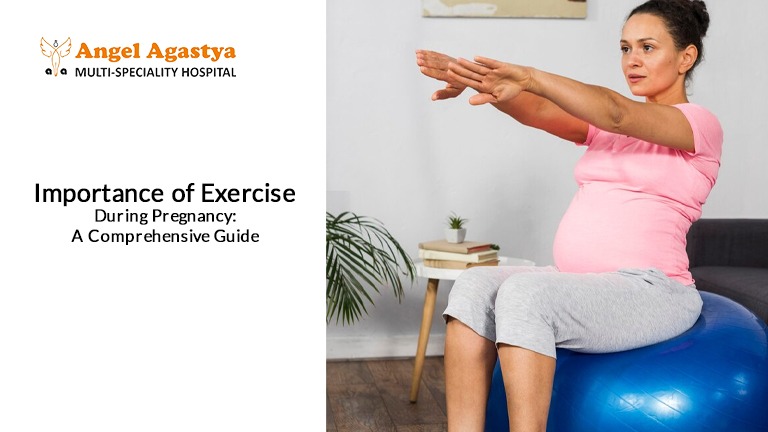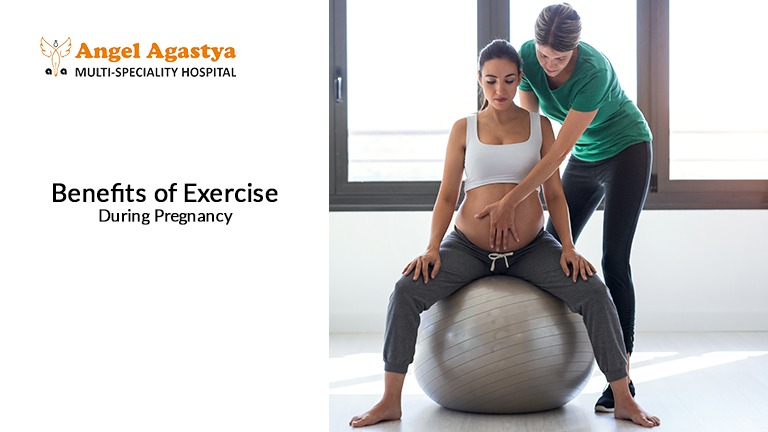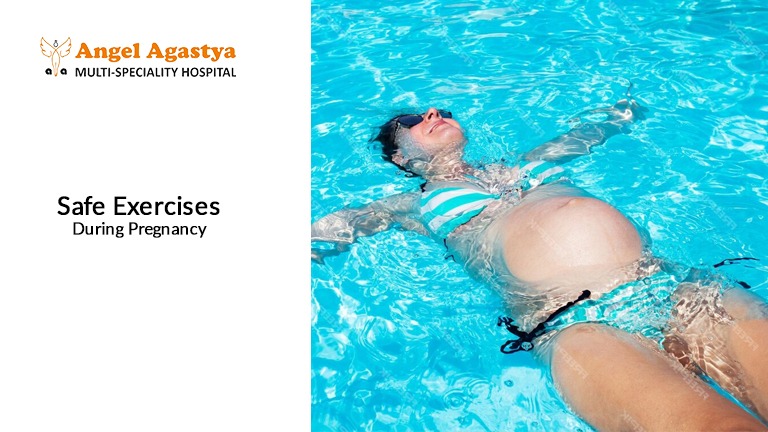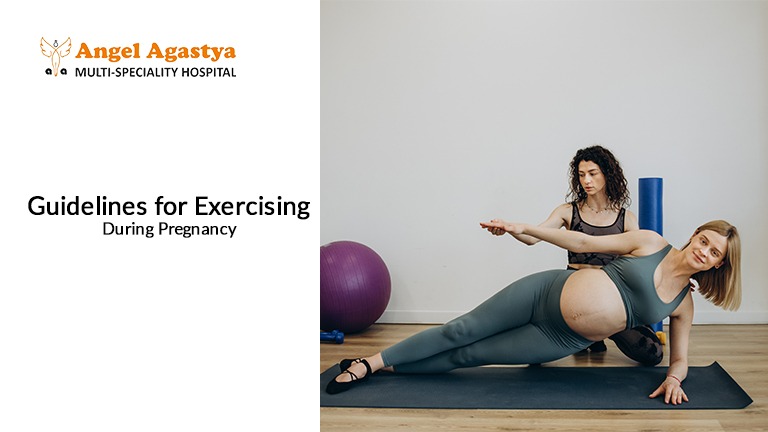Importance Of Exercise During Pregnancy:A Comprehensive Guide
Think pregnancy is a time to slow down and avoid movement? Not quite! Exercise during pregnancy is not only safe for most women—it’s incredibly beneficial. From boosting your energy and mood to easing aches and even making labor smoother, staying active is one of the smartest choices you can make for yourself and your baby. Let’s explore how the right exercises can transform your pregnancy experience!
INTRODUCTION

Pregnancy is a transformative journey that significantly changes a woman’s body. Many women believe they should avoid exercise during pregnancy, fearing it might harm the baby. However, this is a misconception. Regular, moderate exercise during pregnancy is not only safe but highly beneficial. It contributes to both physical and mental well-being, making the pregnancy experience smoother and more comfortable for both mother and baby.
Engaging in safe and appropriate physical activity during pregnancy can help manage common discomforts, promote overall health, and prepare the body for labor. This comprehensive guide explores the importance of exercise during pregnancy, the benefits, safe exercise choices, precautions, and key guidelines.
Benefits of Exercise During Pregnancy

Exercise during pregnancy offers a wealth of benefits, impacting various aspects of a woman’s health. These benefits include improvements in physical health, mental well-being, and labor preparation.
Physical Health Benefits
Weight Management
- Pregnancy naturally involves weight gain, but excessive weight gain can lead to complications such as gestational diabetes and high blood pressure.
- Regular physical activity helps regulate weight gain within recommended guidelines.
- Reduced Pregnancy Discomforts
- Many women experience back pain, swelling, constipation, and fatigue during pregnancy.
- Exercise can strengthen muscles, improve circulation, and boost energy levels, reducing these discomforts.
- Improved Cardiovascular Health
- Pregnancy puts extra stress on the cardiovascular system. Exercise strengthens the heart and improves circulation and blood pressure.
- Maintaining good cardiovascular health benefits both the mother and baby.
- Increased Energy Levels
- Exercise helps fight pregnancy-related fatigue by improving blood flow and oxygen supply.
- Endorphins released during exercise enhance energy levels and promote well-being.
- Better Sleep Quality
- Many pregnant women struggle with insomnia and disrupted sleep patterns.
- Regular exercise helps regulate sleep cycles, reducing stress and promoting deeper sleep.
- Reduced Risk of Gestational Diabetes
- Gestational diabetes is a temporary form of diabetes that can occur during pregnancy, increasing risks for both mother and baby.
- Exercise helps control blood sugar levels, reducing the likelihood of developing gestational diabetes.
- Reduced Risk of Preeclampsia
- Preeclampsia is a pregnancy complication characterized by high blood pressure and protein in the urine.
- Regular physical activity may lower the risk of developing this condition.
Mental and Emotional Well-Being Benefits
- Stress Reduction
- Pregnancy is an emotional time, and stress levels can rise due to hormonal changes and concerns about childbirth.
- Exercise acts as a natural stress reliever, helping reduce anxiety and promote relaxation.
- Mood Enhancement
- Physical activity triggers the release of endorphins, also known as “feel-good hormones.”
- This can help combat pregnancy blues and improve overall mood.
- Reduced Anxiety and Depression
- Studies show that regular exercise may help prevent or reduce symptoms of anxiety and depression during pregnancy.
- It provides a healthy emotional outlet and promotes mental clarity.
- Improved Body Image
- Many women struggle with body changes during pregnancy.
- Staying active helps maintain muscle tone, promoting a positive body image and self-confidence.
Labor and Delivery Benefits
- Strengthened Muscles for Labor
- Exercise strengthens the pelvic muscles and core, which can help during labor and delivery.
- Stronger muscles may contribute to shorter labor and reduce complications.
- Better Endurance for Childbirth
- Labor is physically demanding, requiring strength, endurance, and stamina.
- Regular exercise prepares the body to handle the intensity of labor.
- Faster Postpartum Recovery
- Women who stay active during pregnancy often recover faster postpartum.
- Exercise helps the body return to pre-pregnancy shape more quickly.
Safe Exercises During Pregnancy
It’s important to choose safe and appropriate exercises that support pregnancy without causing strain or injury.

Recommended Activities
- Walking
- Walking is one of the safest and most effective exercises for pregnant women.
- It improves cardiovascular fitness without putting too much pressure on joints.
- Swimming and Water Aerobics
- Swimming is gentle on joints and provides a full-body workout.
- Water buoyancy helps relieve swelling and back pain.
- Prenatal Yoga and Pilates
- Yoga improves flexibility, strength, and balance.
- Pilates focuses on core and pelvic floor muscles, essential for labor preparation.
- Strength Training
- Light weightlifting or resistance band exercises can help maintain muscle tone.
- Avoid heavy weights and always use proper form.
- Pelvic Floor Exercises (Kegels)
- Strengthening pelvic floor muscles prevents incontinence and supports the uterus.
- Kegels improve postpartum recovery and labor endurance.
Exercises to Avoid
- High-Impact Activities
- Activities such as running, jumping, or intense aerobics should be avoided in late pregnancy.
- These put extra pressure on joints and increase the risk of falls.
- Contact Sports
- Basketball, soccer, and other contact sports risk abdominal injury and should be avoided.
- Scuba Diving
- Changes in pressure can be dangerous for the developing baby.
- Lying on the Back After the First Trimester
- This can compress the vena cava, restricting blood flow to the baby.
- Hot and Humid Environments
- Overheating during exercise is dangerous for the baby.
- Always exercise in a cool, well-ventilated space and stay hydrated.
Guidelines for Exercising During Pregnancy

- Consult Your Doctor
- Always check with a healthcare provider before starting a new exercise routine.
- Listen to Your Body
- Stop exercising if you experience dizziness, chest pain, vaginal bleeding, or contractions.
- Stay Hydrated
- Drink water before, during, and after exercise to prevent dehydration.
- Wear Comfortable Clothing and Shoes
- Loose-fitting clothes and supportive shoes help prevent discomfort and injuries.
- Warm-Up and Cool Down
- Always start with gentle stretches and finish with a cool-down period.
When to Avoid Exercise During Pregnancy
While exercise during pregnancy is generally beneficial, certain medical conditions can make it unsafe. If you have any of the following conditions, consult your doctor before engaging in physical activity:
1. Severe Anemia
Anemia occurs when the body lacks enough red blood cells to carry oxygen efficiently. Severe anemia during pregnancy can lead to extreme fatigue, dizziness, and shortness of breath. Exercising in this condition may further reduce oxygen levels, putting both the mother and baby at risk.
2. Uncontrolled Diabetes or Hypertension
- Uncontrolled diabetes can cause fluctuating blood sugar levels, making physical activity unsafe. Exercise affects insulin sensitivity, which could lead to dangerously low or high blood sugar if not properly managed.
- Uncontrolled hypertension (high blood pressure) increases the risk of complications like preeclampsia and stroke. Exercise naturally raises heart rate and blood pressure, which may worsen these conditions.
3. Heart or Lung Disease
If a pregnant woman has a pre-existing heart or lung condition, her body may already struggle to supply enough oxygen to both her and the baby. Exercise increases oxygen demand, which can put excess strain on an already compromised heart or respiratory system. Conditions like congenital heart disease, arrhythmia, or chronic asthma should be closely monitored.
4. Placenta Previa After 26 Weeks
Placenta previa is a condition where the placenta covers part or all of the cervix, increasing the risk of bleeding. After 26 weeks of pregnancy, exercise can put pressure on the uterus, potentially causing contractions or bleeding. Women diagnosed with this condition should avoid strenuous activities and follow their doctor’s recommendations.
5. Preterm Labor Risks
Women with a history of preterm labor or those experiencing signs of early contractions should avoid high-impact activities. Exercise can sometimes stimulate uterine contractions, increasing the risk of preterm birth. If a woman has been advised to rest due to an incompetent cervix or preterm labor threats, exercise should be avoided altogether.
Final Advice
If you have any of these conditions, always consult your doctor before engaging in exercise during pregnancy. Even if you are healthy, listen to your body and stop exercising if you experience dizziness, vaginal bleeding, severe pain, or contractions.
Conclusion
Exercise during pregnancy is highly beneficial for both the mother and baby. It helps manage weight, improves cardiovascular health, reduces discomforts, and prepares the body for labor. Additionally, it supports mental well-being by reducing stress, anxiety, and depression.
By choosing safe and appropriate activities, following recommended guidelines, and listening to their bodies, pregnant women can enjoy a healthier and more comfortable pregnancy. Always consult with a healthcare provider before beginning any new exercise routine.
FAQs
Is Exercise During Pregnancy Safe?
Yes, exercise during pregnancy is safe for most women and is highly recommended. It helps manage weight, reduces discomforts like back pain and swelling, and improves overall health. However, it’s important to consult your doctor before starting any new workout routine, especially if you have any pregnancy complications.
2. What Are the Benefits of Exercise During Pregnancy?
Exercise during pregnancy offers multiple benefits, including better weight control, improved cardiovascular health, reduced stress and anxiety, fewer pregnancy-related discomforts, and preparation for labor. Staying active can also lead to a faster postpartum recovery.
3. How Often Should I Exercise During Pregnancy?
Experts recommend at least 150 minutes of moderate-intensity exercise per week, spread over 3-5 days. This could include walking, swimming, or prenatal yoga. Always listen to your body and adjust as needed.
4. What Exercises Are Safe During Pregnancy?
Safe exercise during pregnancy includes walking, swimming, prenatal yoga, Pilates, light strength training, and pelvic floor exercises (Kegels). These activities help improve endurance, flexibility, and muscle strength without putting excessive strain on the body.
5. What Exercises Should Be Avoided During Pregnancy?
High-impact exercises like running, jumping, contact sports, heavy lifting, and activities that involve lying on your back after the first trimester should be avoided. Overheating and dehydration should also be prevented while exercising.
6. Can Exercise During Pregnancy Help with Labor?
Yes, exercise during pregnancy strengthens pelvic muscles, improves stamina, and enhances flexibility, all of which can make labor and delivery easier. Women who exercise regularly may experience shorter labor and fewer complications.
7. Can Exercise Reduce Pregnancy-Related Back Pain?
Absolutely! Exercise during pregnancy helps strengthen core and back muscles, improves posture, and relieves pressure on the spine. Activities like prenatal yoga and swimming are particularly effective in reducing back pain.
8. Is Walking a Good Exercise During Pregnancy?
Yes, walking is one of the safest and most effective exercises during pregnancy. It improves cardiovascular fitness, boosts energy, and helps regulate weight without putting too much strain on the joints.
9. Can Exercise Help Prevent Gestational Diabetes?
Yes, regular exercise during pregnancy helps control blood sugar levels and improves insulin sensitivity, reducing the risk of gestational diabetes. Activities like brisk walking, swimming, and strength training are highly beneficial.
10. When Should I Stop Exercising During Pregnancy?
Stop exercise during pregnancy immediately if you experience dizziness, shortness of breath, vaginal bleeding, contractions, or severe discomfort. Always listen to your body and consult your doctor if any symptoms arise.

